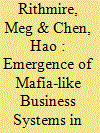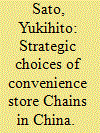| Srl | Item |
| 1 |
ID:
174821


|
|
|
|
|
| Summary/Abstract |
This article explores how the political connections cultivated by Pakistan’s business groups contributed to their rise as key actors in the corporate sector. Such connections have long been used by business groups in developing countries to secure access to economic rents from politicians in power. We examine the basis of selection of business groups for state patronage under military and civilian-led regimes, as well as the extent to which such ties have contributed to their rise as Pakistan’s leading enterprises. A historical analysis is provided of these groups, with a focus on a financial review of their publicly listed companies. We find that emerging business groups actively resort to rent-seeking activities by colluding with ruling elites, while also using multifaceted networking to protect and enhance their presence in the corporate sector.
|
|
|
|
|
|
|
|
|
|
|
|
|
|
|
|
| 2 |
ID:
183235


|
|
|
|
|
| Summary/Abstract |
A large body of literature on state–business relations in China has examined the political role of capitalists and collusion between the state and the private sector. This paper contributes to that literature and understanding of the internal differentiation among China's business elites by documenting the emergence of a particular kind of large, non-state business group that we argue is more akin to a mafia system than any standard definition of a firm. Drawing on large-N descriptive data as well as deep ethnographic and documentary research, we argue that mafia-like business systems share organizational principles (plunder and obfuscation) and means of growth and survival (relations of mutual endangerment and manipulation of the financial system). Understanding the particular moral economy that underlies mafia-like business systems and their interactions with the state challenges methodological foundations of research on China's political economy and helps to explain recent conflict between high-profile business people and the state.
|
|
|
|
|
|
|
|
|
|
|
|
|
|
|
|
| 3 |
ID:
087427


|
|
|
|
|
| Publication |
2009.
|
| Summary/Abstract |
Two large Japanese convenience store chain companies, namely 7-Eleven Japan and FamilyMart, both of which set up businesses in China in 2004, have followed entirely different strategies. FamilyMart chose a team management strategy which is distinguished by fully utilizing the resources of its Taiwanese subsidiary and forming a partnership with a big Taiwanese business group, Ting Hsin International Group in China. By contrast, 7-Eleven Japan built up its China subsidiary almost wholly by itself, a policy that can be described as a managing-alone strategy. The differences in strategy stem fundamentally from differences in the two companies' experience of international management and from the knowledge derived from that experience. And their choice of strategies has also been shaped by the interactions between two Taiwanese business groups, namely the Ting Hsin International Group and the President Group. Furthermore, we find that FamilyMart's strategy enabled it to build up its operations more quickly than the policy adopted by 7-Eleven Japan. Although the latter's strategy is more time-consuming, it offers a stronger possibility of establishing a more efficient and more transparent business model than the approaches followed by other convenience store chains.
|
|
|
|
|
|
|
|
|
|
|
|
|
|
|
|